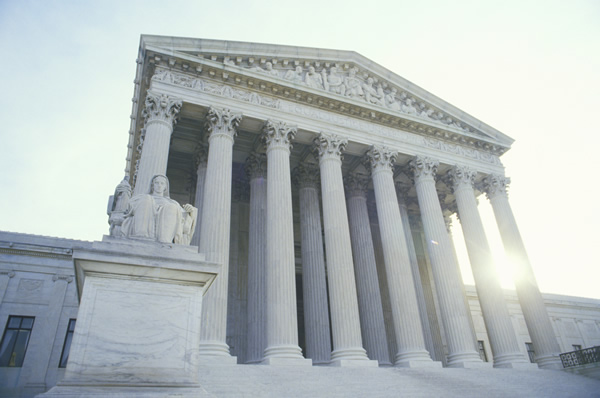Newscom
This week, the Supreme Court issued a historic decision that will help prevent U.S. courts (and activist judges) from interfering in foreign policy issues that are—and should be—the constitutional prerogative of the executive and legislative branches.
Kiobel v. Royal Dutch Petroleum involved the Alien Tort Statute (ATS), which was passed by the First Congress in 1789. It provides federal courts with jurisdiction over “any civil action by an alien for a tort only, committed in violation of the law of nations or a treaty of the United States.”
In Kiobel, Nigerians who were granted political asylum in the U.S. sued Royal Dutch Petroleum and another Shell company that were incorporated in the Netherlands and England, respectively. Another defendant was a jointly owned Shell Nigerian subsidiary involved in oil exploration and production. The Nigerians claimed that government military and police forces attacked them in Nigeria and were aided by Shell companies providing food, transportation, and use of their property as a staging ground for attacks.
The ATS was a rarely invoked statute for most of our history—it was used twice in the late 1700s and then only once more during the next 167 years. It is only recently that the ATS began to be used by human rights lawyers trying to go after international defendants for acts committed abroad. The key question in this case was whether the ATS gives American courts jurisdiction over “conduct occurring in the territory of a foreign sovereign.” All nine justices agreed that this case should be dismissed, but they disagreed on the applicability of the federal statute.
Chief Justice John Roberts, joined by the conservative justices, noted that when Congress passed the ATS, there were only three principal offenses against the law of nations: (1) violation of safe conducts (i.e., the ability to travel unmolested through U.S. territory), (2) infringement of the rights of ambassadors, and (3) piracy.
The first two offenses have nothing to do with extraterritorial application, since they concern the diplomatic immunity of ambassadors within U.S. territory. Piracy concerns conduct generally on the high seas, which is not within the territory or sovereignty of any particular nation. In fact, the passage of the ATS was spurred by an attack on the French ambassador in Philadelphia in 1784 and the arrest of a servant of the Dutch ambassador in his residence by a New York constable in 1787.
To the majority, it was plain that nothing in the text, history, and purposes of the ATS show that Congress intended it to apply outside the jurisdiction of the United States. Congress can pass a federal law that applies to Americans’ conduct abroad, and it has done so in a number of statutes, such as the Genocide Accountability Act of 2007. However, the ATS is not one of them.
In fact, the majority recognized that allowing such extraterritorial jurisdiction would pose a danger in “the delicate field of international relations.” The presumption that exists “against extraterritorial application helps ensure that the Judiciary does not erroneously adopt an interpretation of U.S. law that carries foreign policy consequences not clearly intended by the political branches.”
A minority of the justices—Breyer, Ginsburg, Sotomayor, and Kagan—concurred in the judgment, but they asserted that a claim should go forward under the ATS if, among other factors, “the defendant’s conduct substantially and adversely affects an important American national interest, and that includes a distinct interest in preventing the United States from becoming a safe harbor (free of civil as well as criminal liability) for a torturer or other common enemy of mankind.”
The obvious problem with such a rule is that it would give federal judges the power to decide what are important American national interests in foreign policy and national security. These are duties that are assigned to the executive and legislative branches, not the judicial branch. The minority justices assert that federal courts should “give serious weight to the Executive Branch’s view of the case’s impact on foreign policy.” But that would not remedy the bad effects of such a rule, because federal judges would still have the ability to override the executive and legislative branches.
While this case was about Nigerian citizens, the holding protects American sovereignty and American citizens. As the Court pointed out, granting the Nigerians claims would imply that other nations “could hale our citizens into their courts for alleged violations of the law of nations occurring in the United States or anywhere else in the world.” That would be a bad result. After all, one of the reasons stated in the Declaration of Independence for breaking with King George III was for “transporting us beyond Seas to be tried for pretended Offences.”
Source material can be found at this site.










